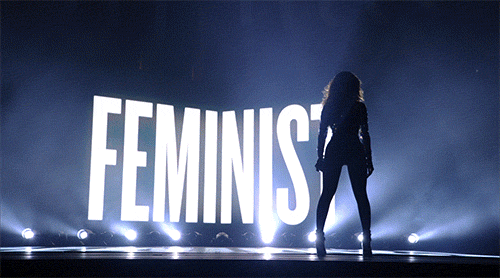I am a proud feminist. I'm pro-choice. I advocate for comprehensive sexuality education and reproductive justice. I teach courses on theology, gender, and sexuality. I'm certain Burwell v. Hobby Lobby was bad news for religious liberty. I think Emma Watson is kind of a badass. I want to steal Beyonce's set from the VMAs and keep it in my living room. And I do all those things not in spite of my faith, but because of it.
This week, I attended a gathering on faith and feminism sponsored by the Georgetown Berkley Center for Religion, Peace and World Affairs. I quickly discovered that many of us in the room differed significantly on how we understand the term feminism. But we had in common the experience of a feminism shaped by our faith lives.
Berkley Center scholar Katherine Marshall recently authored a HuffPo piece on feminist "aha moments." She wrote:
What's needed, urgently, is a thoughtful conversation about how faith and feminism are linked. It needs to honor and respects feminism's central commitment to true equal rights and women's spiritual heritage and commitment to their central religious values.
I want to extend Marshall's idea further. "Thoughtful conversation" about faith and feminism can also include talking about the ways women are actively shaping the values of their religious traditions -- and what that means for faithful feminists.
What do I think it means to be both faithful and feminist?
For me, faithful feminism at its core is about believing that women really and truly matter. Not just certain parts of women (say, their wombs or their boobs), or certain types of women (say, white, properly-behaved affluent women), but every part and every woman. Why? The Christianity with which I was raised (first Baptist, later Methodist) taught me that serving God was intimately tied to serving others. Nobody was outside the scope of that call -- everybody was called to serve, and everybody deserved love and care. To limit how women can participate in that call, or to narrowly prescribe how love and care are to be extended to women, fails to recognize the fullness of our faith's message. We all matter. We are all called to join God in working for peace and justice in the world.
In my life and work, believing women matter to God translates especially to believing that their bodies matter. This means advocating for real, affordable access to the full range of healthcare options afforded to women under the law, affirming a woman's right to follow her conscience in making decisions about family planning, taking our culture's deep problems with rape and domestic violence seriously, and critiquing how income inequality exploits women's work -- and especially the work of women of color. The scriptures of my faith tradition tell me God wants three things: for us to do justice, love mercy, and walk humbly. I don't know how to follow this call and not embrace feminist values like the ones I list above.
Feminist theology provided the resources I needed to pull these commitments together. In seminary, a book by theologian and seminary president Serene Jones (who Marshall mentions in her article), had a major impact on my own connection of faith to feminism. Jones put words to something I couldn't -- the nagging sense that women's experiences should mean something more to how we talk about faith, spirituality and religious practice.
Serene Jones is part of a long line of feminist theologians. Their names might not be as regularly known outside of academics, but these women have radically changed how many of us in mainline Christian denominations talk about gender.
Over the past 40 years, feminist theologians have helped generations of students raise questions about God, gender and sexuality. They've found new imagery within the scriptures, extending the picture of God far beyond an old bearded guy in the sky. They've highlighted the stories of female biblical characters who challenged cultural gender norms while fiercely defending those that society often ignores. Feminists have also pointed out the violence and hypocrisy that plague many of our longstanding traditions about God and church leadership. They've challenged the language of "traditional family values." They've proposed new ways for understanding a God who "makes a way out of no way." Feminists have also challenged each other to do a better job considering the plural ways race, class, disability, and sexual identity shape what we call "women's experience." Feminist theologians from developing nations have also begun to help North Americans find their own blind spots when it comes to narrating gender inequality and first world privilege. And along the way, feminist theologians have even managed to suggest that sex, and female sexuality, are good things!
This is not, however, solely a task for academics or women clergy. Each year, I tell students and congregation members that they are theologians too. Theology is just the way people of faith make sense of the world through the lens of their religious scriptures, traditions, and experiences. Faithful feminist theology doesn't happen only in classrooms and pulpits, but also in pews, living rooms, workplaces, and public service. Faithful feminists are pushing their religious traditions to take women and their lives seriously. They are also helping others realize the critical role that religion is playing in their calls for broader social justice. That's the feminism, and the faith, that continues to form and challenge me every day.
